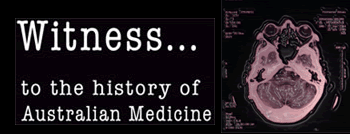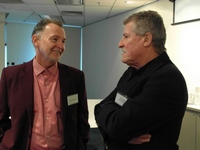


Tobacco Control: Australia's Role
Transcript of Witness Seminar
Introduction
Building the case for tobacco control
Producing, and Responding to, the Evidence
Campaigning for Tobacco Control
Economic Initiatives in Tobacco Control
The Radical Wing of Tobacco Control
Revolutionary Road
Tobacco Industry Strategies and Responses to Them
Campaign Evaluation
Managing Difficulties in Light of Community Consensus
Radical Wing Again
The Process of Political Change
Tobacco Campaigns Up Close
A Speedier Pace of Change
Political Needs and Campaign Strategies
Litigation and its Impacts
Insights from Tobacco Control
Tobacco Control in Australia in International Perspective
Appendix 1: Statement by Anne Jones
Endnotes
Index
Search
Help
Contact us

Lyn Roberts: Can I jump in and make a link to something else? I was interested to hear what people thought about the various tobacco strategies that we’ve had led by the Federal Government and its drug strategy. I think those strategies weren’t entirely useless documents. Whereas in the obesity area, we’ve had an awful lot of reports.
But in the tobacco area, David, the stategies were there. Did that play an important role in supporting all that was going on, or were they useless?
Ron Borland: I think it’s notable that the National Expert Advisory Committee on Tobacco survived when all the other expert committees were abolished because it had actually done something useful.
Paul Fishlock: From a campaign perspective. One of the lessons has to be consistency and commitment in that whilst lots of things have been going on, there has been an unrelenting background noise of health effects for thirty years.
You see some of these other issues trying over here, trying over there, and so on.
Garry Egger: That’s because of the silos and they’ve all got their own agendas. And nobody’s agreeing on one thing as they did with tobacco, for instance it’s quit (as opposed to ‘cut down’), that’s all there is to it.
Maree Davidson: Regarding national strategy aspect and working across the whole range of conditions. One of the things about the tobacco strategies over the years, they have been as much as possible evidence-based, or they’ve been looking for the evidence. And they have been clearly articulated strategies, with incremental steps, the raft of strategies needed to achieve certain goals, as well as some shorter and longer term realities around it. And there has been some buy in to it. Part of that is because there is an already existing network both within and outside government that is able to contribute to it and make those messages clear. I think that’s one of the points that differentiates the work on tobacco.
Michelle Scollo: I’d agree with that. It’s often not recognised but if you go through, for instance, the last National Tobacco Strategy with a green pen and tick what’s been done. They did use that as a guide at all levels of government to guide what they did. A lot of it was worked on and achieved.
I’d also agree on the point about clarity, having been involved in a number of these Tobacco Control Strategies. We did put an enormous amount of effort into making the words real and mean something, not just a lot of fluff. We tried really hard to make them say what we wanted to happen as clearly and specifically and as concretely as possible. And I do think that helps.
Mike Daube: Just an observation. It’d be interesting to map where tobacco is different from the other industries or some of the other big areas. For instance, for as long as I can remember, we’ve been able to say pretty much what we liked about the tobacco industry because it was true. That’s been absolutely black and white. We’ve been able to say ‘evil’, ‘liars’ and whatever else, and nobody even thinks about worrying about litigation, because it’s all true.
It’s also interesting the way the (tobacco) industry has handled (the tobacco control lobby in) Australia. They put a lot of effort into Australia in the 1980s. I think they then started accepting that it was a ‘dying market’. Then they came back again in recent years because of implications elsewhere.
My sense is that we haven’t until recently, and then for only a brief period even then, faced what we saw in the 1980s where the industry tried to be on the television at every opportunity, with Dollison[179] and Webb[180] and people like that. That has changed as has the calibre of the people they have. They used to have some pretty smart, albeit nasty, people.
Rohan Greenland. When was the Tobacco Institute wound up?
Mike Daube: That’s a good point. You (John Cain) would have had the Tobacco Institute coming at you, wouldn’t you?
David Hill: On that question of whether the tobacco industry is unique or not. This is pure anecdote, but it resonated with me. I was sitting in on a conversation with half a dozen plaintiff lawyers and others. These guys had come to the conclusion that the tobacco industry is unique. They (lawyers) included some who represented some nasty companies that we’d disapprove of.
They said the tobacco industry does stand out as being unshameable. With all the other industries, they felt, there was a point at which the public odium was such that they would change. But they didn’t think the tobacco industry was at that threshold.
Mike Daube: I think some of that has changed since the days when I started getting involved.
The people at the top of the companies then made wrong decisions and did nasty things. But they’d come into tobacco before the war, in the days when it was still respectable. Whereas more and more now, those coming into the industry know exactly what tobacco does.
Simon Chapman: Every day BAT tweets about smuggling. And it was only a few months ago that they were fined £650,000 for oversupplying cigarettes into Belgium so that they could be then given to smugglers. And of course they didn’t put a press release out about that. Unbelievable. They know what they’re doing. Yet still in 2015 they run this unctuous line.
Garry Egger: I guess that’s the point I’m trying to make. Sure there’s behaviour change but in tobacco, there’s one very identifiable enemy that’s regarded as evil, even within the general population these days. Whereas in these other epidemics it’s not as simple as that.

L-R: Dr Terry Slevin and Dr Garry Egger, 29 May 2015. Image courtesy of Ann Westmore.
Kathy Barnsley: Regarding alcohol, I have doctor friends who own wineries. I’ve been to conferences where people are presented with bottles of wine. People would never be presented with a carton of tobacco.
You’re right. There is a complete difference in perception. The vilification of the tobacco industry has been critical and continues to be critical. We have to continue doing it. But with food and alcohol it’s entirely different.
 |
Witness to the History of Australian Medicine |  |
© The University of Melbourne 2005-16
Published by eScholarship Research Centre, using the Web Academic Resource Publisher
http://witness.esrc.unimelb.edu.au/165.html